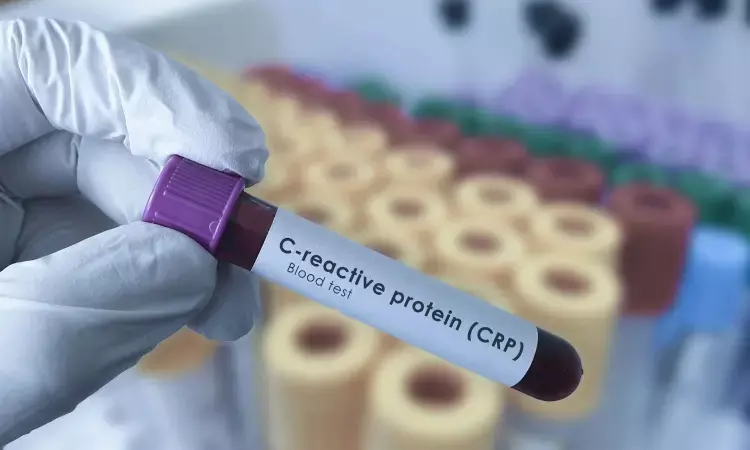- Home
- Medical news & Guidelines
- Anesthesiology
- Cardiology and CTVS
- Critical Care
- Dentistry
- Dermatology
- Diabetes and Endocrinology
- ENT
- Gastroenterology
- Medicine
- Nephrology
- Neurology
- Obstretics-Gynaecology
- Oncology
- Ophthalmology
- Orthopaedics
- Pediatrics-Neonatology
- Psychiatry
- Pulmonology
- Radiology
- Surgery
- Urology
- Laboratory Medicine
- Diet
- Nursing
- Paramedical
- Physiotherapy
- Health news
- Fact Check
- Bone Health Fact Check
- Brain Health Fact Check
- Cancer Related Fact Check
- Child Care Fact Check
- Dental and oral health fact check
- Diabetes and metabolic health fact check
- Diet and Nutrition Fact Check
- Eye and ENT Care Fact Check
- Fitness fact check
- Gut health fact check
- Heart health fact check
- Kidney health fact check
- Medical education fact check
- Men's health fact check
- Respiratory fact check
- Skin and hair care fact check
- Vaccine and Immunization fact check
- Women's health fact check
- AYUSH
- State News
- Andaman and Nicobar Islands
- Andhra Pradesh
- Arunachal Pradesh
- Assam
- Bihar
- Chandigarh
- Chattisgarh
- Dadra and Nagar Haveli
- Daman and Diu
- Delhi
- Goa
- Gujarat
- Haryana
- Himachal Pradesh
- Jammu & Kashmir
- Jharkhand
- Karnataka
- Kerala
- Ladakh
- Lakshadweep
- Madhya Pradesh
- Maharashtra
- Manipur
- Meghalaya
- Mizoram
- Nagaland
- Odisha
- Puducherry
- Punjab
- Rajasthan
- Sikkim
- Tamil Nadu
- Telangana
- Tripura
- Uttar Pradesh
- Uttrakhand
- West Bengal
- Medical Education
- Industry
Study: TAVR Patients with High CRP Levels at risk of Increased Infection Risks

Switzerland: A recent study has found favorable long-term survival and reduced risk of valve dysfunction in patients undergoing TAVR with elevated pre-procedural CRP levels. However, they are at higher risk for periprocedural infections and subsequent hospital readmissions related to infections of various types during the follow-up period.
The findings were published online in Cardiovascular Revascularization Medicine on July 6, 2024.
Transcatheter aortic valve replacement (TAVR) has revolutionized the treatment of aortic valve stenosis, offering a minimally invasive alternative to open-heart surgery for many patients. Recent research has delved into the role of elevated C-reactive protein (CRP) levels before TAVR. However, there is no clarity on its impact on the long-term results of TAVR. Considering this, Stefan Toggweiler, From the Heart Center Lucerne, Cardiology Division, Luzerner Kantonsspital, Lucerne, Switzerland, and colleagues aimed to investigate the long-term (up to six years) clinical outcomes of TAVR patients with normal compared to elevated CRP levels before TAVR.
For this purpose, the researchers included consecutive patients undergoing TAVR between 2012 and 2023 at a tertiary cardiology facility. They were categorized into two cohorts based on the baseline CRP levels: normal CRP (≤ 5 mg/l) and elevated CRP (>5 mg/l). Patients were clinically monitored for up to six years following TAVR.
According to the authors, the study is the first to comprehensively examine outcomes after TAVR in patients with pre-procedural CRP elevation during a prolonged follow-up period of up to six years.
The study led to the following findings:
- From a total of 1000 TAVR patients (mean age 81 ± 6 years), 27 % of patients had elevated baseline CRP (>5 mg/l).
- Such patients had significantly more co-morbidities (e.g., chronic obstructive pulmonary disease, atrial fibrillation, heart failure, concomitant valvopathies).
- They also developed periprocedural infections more frequently (3 % versus 1 %) and required more commonly repeat hospitalizations for infections during follow-up (HR 1.97).
- All-cause mortality and development of valve dysfunction did not significantly differ between patients with elevated and normal baseline CRP levels.
"Our study found that patients with elevated CRP levels undergoing TAVR experienced favorable long-term outcomes, with no significant differences in long-term survival or valve dysfunction compared to those with normal CRP levels. However, elevated baseline CRP was associated with increased rates of periprocedural infections and hospital readmissions due to infections," the researchers concluded.
Reference:
Brunner, S., Moccetti, F., Loretz, L., Conrad, N., Bossard, M., Attinger-Toller, A., Kurmann, R., Cuculi, F., Wolfrum, M., & Toggweiler, S. (2024). The impact of elevated C-reactive protein levels on long-term outcomes of patients undergoing transcatheter aortic valve replacement. Cardiovascular Revascularization Medicine. https://doi.org/10.1016/j.carrev.2024.07.002
Dr Kamal Kant Kohli-MBBS, DTCD- a chest specialist with more than 30 years of practice and a flair for writing clinical articles, Dr Kamal Kant Kohli joined Medical Dialogues as a Chief Editor of Medical News. Besides writing articles, as an editor, he proofreads and verifies all the medical content published on Medical Dialogues including those coming from journals, studies,medical conferences,guidelines etc. Email: drkohli@medicaldialogues.in. Contact no. 011-43720751


